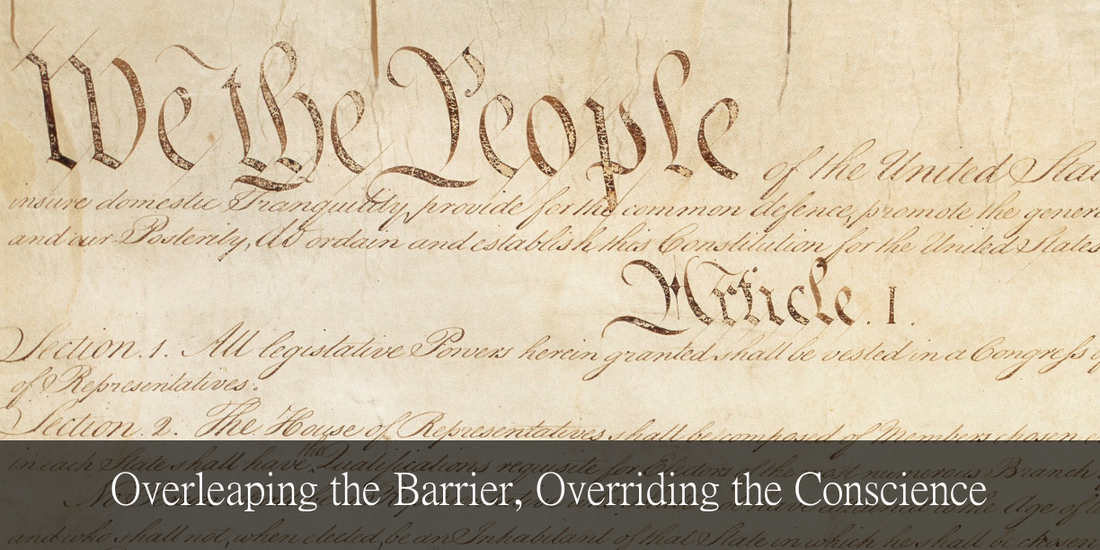Congress shall make no law respecting an establishment of religion, or prohibiting the free exercise thereof; or abridging the freedom of speech, or of the press; or the right of the people peaceably to assemble, and to petition the Government for a redress of grievances.
Freedom of Religion means what? Thomas Jefferson famously spoke of a wall of separation between church and state. Strong language, especially in a world accustomed to the state (the king) often building the actual foundations and walls of churches. James Madison spoke of “the great Barrier.” That’s even stronger. A barrier sounds almost martial—erecting barricades to repel the armed invaders. And Madison is no flack hurling grenades from the sideline to score political points. He’s the one who drafted the First Amendment. When he speaks of “the great Barrier” Madison is contending that the government not be allowed “to overleap the great Barrier which defends the rights of the people.” The Barrier should be impenetrable, so that the government can’t breach the free exercise of religion.
That was in 1785 that Madison wrote of the great Barrier. In just a few years, he would write the words of the First Amendment, and from then on, every American would know that the “free exercise of religion” was a constitutionally guaranteed right—non-negotiable.
Fast forward to 2013. The President of the United States stands in front of a crowd “on a hot, steamy Texas afternoon,” as reported by the Huffington Post. He’s there for what must be the most painful task a U.S. president can have. Nidal Malik Hasan, while shouting “Allahu Akbar,” had murdered 13 people in cold blood and wounded others in one of the worst domestic terror attacks since 9/11. And President Obama, “on a hot, steamy Texas afternoon,” was there to speak of justice, of rights, and of comfort. The President solemnly spoke the victims’ names, reverently introducing each with a few words of who they were and how they had honored their nation with their service. He spoke of our nation’s commitment to justice and to “due process of the law,” and then, in the face of raw Islamic terrorism, the President declared, “We are a nation that guarantees the freedom to worship as one chooses.”
But wait. Is there a change being slipped in? The First Amendment says nothing of worship. It’s about the freedom of religion. Are worship and religion synonyms? Why the shift? Words do mean something, and when they’re being shifted, that means something too.
Back, then, to Madison, who wrote the un-shifted words of the First Amendment’s “freedom of religion.” An Islamic terrorist may not be expected to understand what is given in those words (though Major Hasan should’ve—he had vowed to defend that Constitution), but, certainly, any American citizen should understand the words, and any Christian might want to contemplate what religion “and the free exercise thereof” means for the Christian’s life under such a constitutional government.
So what did Madison’s un-shifted words mean? It was in a letter to the General Assembly of the Commonwealth of Virginia in 1785 that Madison had written of “the great Barrier” which the government must not be allowed to “overleap.” In front of the assembly was a bill that would allow the government to use tax money to finance government approved religious schools. But, as Madison pointed out, as good as teaching the Christian religion may sound, the problem was in the government, which was now getting ready to “overleap” the great Barrier. For, if the government schools could determine what religion was to be taught, then that implies that “the Civil Magistrate is a competent Judge of Religious Truth,” or worse, that the Magistrate could “employ Religion as an engine of Civil Policy.” You can’t have that, says Madison. It leads to “an unhallowed perversion of the means of salvation.”
Madison’s concern is not just with good civil government. It is with good civil government that protects the rights of the citizen in order that the government not encroach on the citizen’s conscience. The government is not to be coercive in this. Each citizen, according to Madison, retains “an equal title to the free exercise of Religion according to the dictates of Conscience.” In speaking of “conscience,” Madison was only quoting from Virginia’s constitution, using words already in general acceptance. And there, in the constitution, conscience is a matter of each person’s (not the government’s) “reason and conviction.” From Virginia’s constitution (Bill of Rights, section 16):
Religion, or the duty which we owe to our Creator, and the manner of discharging it, can be directed only by reason and conviction, not by force or violence; and therefore all men are equally entitled to the free exercise of religion, according to the dictates of conscience ...
So, religion (as distinct from worship) is not confined to the four walls of the church building on Sunday morning. It is “the duty which we owe our Creator.” This “religion” is directed by a citizen’s “reason and conviction.” In this way, all men are entitled to “the free exercise of religion” as dictated by their own conscience. Don’t let government overleap that great Barrier, Madison would counsel the free citizen.
When President Obama, on that “hot, steamy Texas afternoon,” declared that “we are a nation that guarantees the freedom of worship,” it was no outlier. Secretary of State Clinton, for instance, issued a press release for “International Human Rights Day” (December 10, 2012) touting our efforts in “advancing universal freedoms ... including the freedom to speak, the freedom to assemble, and the freedom to worship.” Not a word about the freedom of religion. It has been widely noted that Secretary Sebelius (HHS) uses the same “freedom of worship” language.
Dateline, Jefferson City, Missouri, Associated Press, March 18, 2013: “A federal judge has struck down a Missouri law exempting moral objectors from mandatory birth control coverage because it conflicts with an insurance requirement under President Barrack Obama’s health care law.” So, legally, no moral objection to mandatory birth control coverage is allowed. Mandatory birth control coverage, by the way, includes the citizen being required to pay for not only birth control, but also abortifacients and abortions.
Birth control, abortifacients, and abortions, that has us in the realm of the Commandments. The Commandments, that has us in the realm of the conscience, which is informed by the Lord’s Word—the word of Law convicting of sin, bringing the conscience into guilt and shame, the word of Gospel, justifying the sinner, bestowing a cleansed conscience.
So when we’re in the realm of the Commandments, what is the standing of our government? The Lord puts earthly governments in place to protect and promote those things He has instituted in the Commandments, the things of parents and families (4th Commandment), of human life (5th), of the marriage of a man and woman (6th), of home and property, farm and business, and reputation (7th-10th)—this is Caesar wielding the sword. But the Lord doesn’t put governments in place to rule over the conscience. For, while the government is given to be concerned with those things instituted by the Law, the government can say nothing of cleansing the sinner’s conscience.
This conscience does leave the Christian subject to governing authorities (it’s not as if the Christian can ever set himself apart from his world, drifting out on his own, untethered from neighbor and society). But, as Luther notes, the Christian is subject to the governing authorities “to do what they order, so long as they do not bind our conscience and so long as they give commands that pertain to external matters only, even though they deal with us as tyrants do.” What are these “external matters” that do not coerce the conscience? The secular government is to be concerned with such things as “how to secure and fortify the cities, build bridges, fix tolls, levy taxes, provide protection, defend the land and its people, and punish evildoers.” That’s how “Caesar” is to bear the sword (see Rom. 13:1-6). “Therefore,” says Luther, “a Christian can surely be obedient to such a prince, provided that the prince does not give any commands that do violence to a Christian’s conscience” (see, “Divine Kingdom, Holy Order: The Political Writings of Martin Luther,” p. 154, CPH, 2012).
Now we can see the distinction between “freedom of worship” and “freedom of religion” as these terms are used in our culture. Freedom of worship leaves you inside the four walls of the church, doing whatever you want as an exercise of worship. But freedom of religion, which includes worship, also has you outside the walls of the church, in society, speaking and acting as a citizen of uncoerced conscience. That can’t be allowed, though, if your conscience would have you “in conflict” with government requirements to finance “mandatory birth control.” (Madison had spoken of “force and violence” coming from the government. That has been softened to “mandatory.”)
The Christian’s conscience, of course, remains free. Free, certainly, with regard to the Gospel, which cleanses the conscience and frees from the retribution of God’s Law. Free, then, as we are given to live our lives toward our neighbor. Free from coercion, from “force and violence” by a government that would mandate anything against those institutions our Lord establishes in his Commandments. This is Madison’s great Barrier, where constitutional law restrains the government from treading on Freedom of Religion. Where that great Barrier is overleaped, the conscience is being overridden. Yet the Christian’s conscience hears only the Word of the Lord.



 RSS Feed
RSS Feed
